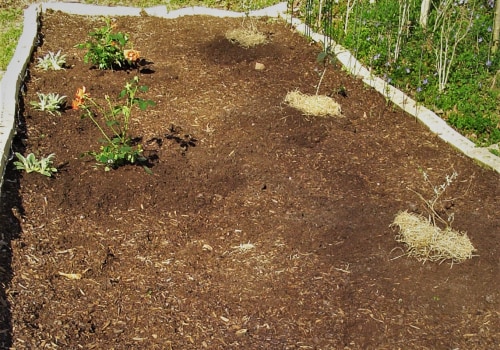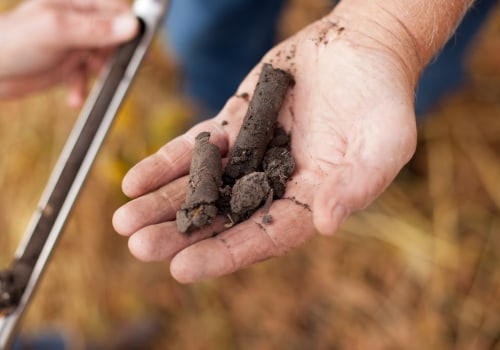Soil pH is an important measure of soil health and fertility, and testing it can provide valuable insight into the conditions of your soil. A pH test for soils measures the acidity or alkalinity of the soil. It can help you determine the best course of action for treating your soil, such as adding fertilizers or amendments to improve its fertility. Understanding how to perform a pH test for soils can provide you with the knowledge to make informed decisions about the care of your soil. In this article, we'll cover everything you need to know about a pH test for soils, including how to conduct the test, what results mean, and how to interpret them.
We'll also discuss why it's important to test soil pH and how you can use the results to make informed decisions about your soil.
A pH test for soils
measures the acidity or alkalinity of the soil. The result of the test is known as the soil’s pH level. The pH level is measured on a scale of 0-14, with 0 being the most acidic and 14 being the most alkaline. A neutral pH level is 7.Most plants grow best in soils with a pH level between 6-7.Knowing the pH level of your soil will help you determine what type of fertilizer or amendments you need to add. Soil pH tests are usually done using a kit that contains a buffer solution and indicator paper or tablets.The buffer solution is mixed with soil and then tested with the indicator paper or tablets. The indicator paper will change color depending on the pH level of the soil. The color change can be compared to a chart that comes with the kit to determine the exact pH level. If you don't have access to a kit, you can also do a simple vinegar or baking soda test.
To do this, mix some soil with either vinegar or baking soda and observe any changes in color or texture. If the soil bubbles when mixed with vinegar, it has a higher alkaline level. If it bubbles when mixed with baking soda, it has a higher acidity level. It’s important to know your soil’s pH level because certain plants require different levels to thrive. For example, blueberries and azaleas prefer acidic soils while grasses and vegetables prefer neutral or slightly alkaline soils.
If you don’t know your soil’s pH level, you won’t be able to effectively adjust it so that your plants can get the nutrients they need. Knowing your soil’s pH level can also help you avoid over-fertilizing or over-watering your plants. If you fertilize your plants when the soil is too acidic or alkaline, the fertilizer may not be able to be absorbed by the plant roots. Similarly, if you water your plants when the soil is too acidic or alkaline, the water may not be able to penetrate the soil and reach the roots. Finally, testing your soil’s pH level can help you detect any potential problems with your soil such as nutrient deficiencies or contaminated runoff from nearby sources. If you know what your soil’s ideal pH level should be, you’ll be able to detect any abnormalities quickly and take action to correct them.
How to Adjust Your Soil's pH Level
Soil pH is an important factor for optimal plant growth.If the pH is too acidic or alkaline, it can be difficult for plants to absorb essential nutrients. Fortunately, there are a number of ways to adjust the pH level in your soil depending on whether it's too acidic or alkaline.
Adjusting Acidic Soil
If your soil is too acidic, you'll need to add a source of lime or calcium carbonate to increase the pH level. This could be ground limestone, dolomite lime, wood ash, or gypsum.The amount of lime you'll need to add will depend on the type of soil and how acidic it is. You can use a soil test kit to determine the exact amount.
Adjusting Alkaline Soil
If your soil is too alkaline, you'll need to add an acidifying agent such as sulfur or iron sulfate. Again, the amount of sulfur or iron sulfate you'll need will depend on the type of soil and how alkaline it is.Regular Soil Tests It's important to regularly test your soil pH level so that you can adjust it when necessary. A soil test kit is an easy and affordable way to do this. With regular testing, you can ensure that your soil pH remains at an optimal level for optimal plant growth.
Benefits of Testing Soil pH
Testing the pH of soil is essential for understanding the fertility and nutrient levels of the soil. Soil pH is a measure of how acidic or alkaline the soil is, and it is important to know the exact pH level of the soil to ensure that plants are growing in the most optimal conditions.Testing soil pH can help you better understand your soil, and provides you with a number of benefits.
Fertilizer Use
: Knowing the pH level of your soil can help you decide which type of fertilizer to use. Different types of fertilizers have different pH levels, so testing the soil pH will allow you to find the best fertilizer for your specific soil.Nutrient Levels
: Testing the pH of your soil can help you understand what nutrients are available in the soil. Different nutrients are available depending on the pH level, so testing can help you understand which nutrients are available for your plants.Soil Amendments
: Soil amendments such as lime or sulfur can help to adjust the pH level of your soil. Testing the pH of your soil will help you determine if any amendments need to be added in order to create the optimal growing conditions for your plants.Healthy Plants
: Testing your soil's pH can help ensure that your plants are growing in healthy conditions.Certain plants require specific pH levels in order to grow correctly, so testing your soil's pH can help you ensure that your plants are getting all of the nutrients they need.
How to Adjust Your Soil's pH Level
Understanding your soil's pH level is important for ensuring your plants are getting the right nutrients. When soil is too acidic or alkaline, it can cause a nutrient imbalance in the soil, leading to unhealthy plant growth. Fortunately, there are several different methods you can use to adjust your soil's pH level.For Soils That Are Too Acidic
When soil is too acidic, you can use one of the following methods to raise the pH level: adding lime, using agricultural sulfur, or using compost. Adding lime is one of the most common methods for raising pH levels in soil.Agricultural sulfur is another option that can be used to adjust soil pH, although it takes longer to take effect than lime does. Finally, using compost can also help raise the pH level of acidic soils. Compost is full of beneficial microorganisms and organic matter that can help balance out the pH of your soil.
For Soils That Are Too Alkaline
If your soil is too alkaline, you can use one of the following methods to lower the pH level: adding elemental sulfur or using acidifying fertilizers. Adding elemental sulfur is one of the most effective ways to reduce the alkalinity of soil.Acidifying fertilizers, such as ammonium sulfate and iron sulfate, are also helpful for lowering the pH level of alkaline soils. Soil pH tests are an important part of understanding your soil. Whether your soil is too acidic or alkaline, there are several different methods you can use to adjust its pH level and ensure that your plants are getting all the nutrients they need.
How to Adjust Your Soil's pH Level
Adjusting your soil’s pH level is essential for optimal plant growth. It can be tricky to get right, but there are several methods you can use depending on whether your soil is too acidic or alkaline. If your soil is too acidic, you can use a soil amendment such as lime to raise the pH.Limestone, dolomite, and calcitic lime are all commonly used for this purpose. You can also add elemental sulfur or aluminum sulfate to lower the pH. If your soil is too alkaline, you can use an acidifying agent like sulfuric acid or iron sulfate. You can also add organic matter, such as compost or manure, which will help to reduce the alkalinity of the soil.
No matter which method you choose, it's important to test your soil regularly and adjust the pH level accordingly. With the right pH balance, your plants will be healthier and more productive. In conclusion, testing your soil's pH level is essential for understanding how to best care for your plants. Knowing the pH level of your soil will enable you to accurately determine the type of fertilizer to use and the amount of water your plants need. Additionally, it can help you identify potential problems with your soil that need to be addressed.
With this knowledge, you can ensure that your plants receive all the nutrients they need to thrive. Soil pH tests are an easy and reliable way to monitor the health of your soil. By regularly testing the pH levels of your soil, you can make sure that your plants get all the nutrients they need to grow and remain healthy.











Leave a Comment